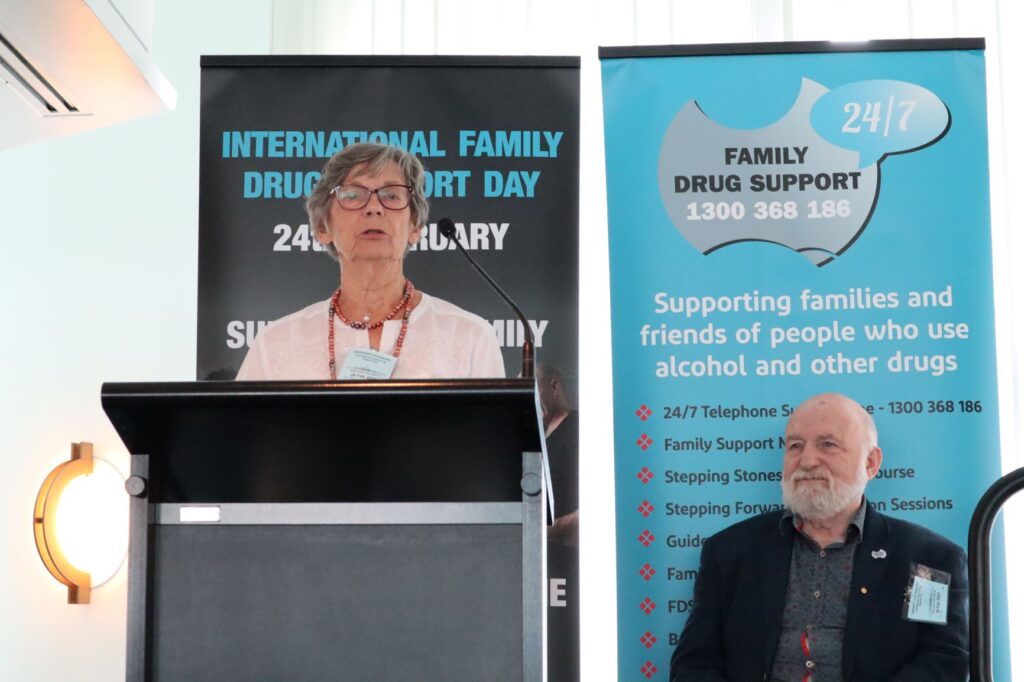Wednesday 24 February, 2021
Parliament House – Canberra
Marion McConnell
Thank you Tony and Family Drug Support for inviting me to speak at this sixth International Family Drug Support Day. This year the focus is on “Family connection – Not Tough Love”
This emphasis reminded me of thoughts I had following my son’s death to a heroin overdose in 1992. I began then to realise how difficult it must have been for him to speak to his family about his drug use. I believe that the fear and propaganda which has been instilled in society under prohibition has made it extremely difficult to communicate effectively about drugs that have been deemed illegal. Certainly, in my own case, I believe that my son would have found it extremely tough to talk to me on these issues because he would have perceived me as a person who was law abiding, who had high standards of ‘morality’ and was naïve to the world of drug taking. Because he probably saw me as believing all the propaganda and stereotyping of the drug user which was endemic in the media and in our society, who could blame him for not coming to me with his problems.
But his perceptions were wrong. When we did find out, he realised our love for him was stronger than any ill-conceived drug laws but unfortunately the laws won out and he died 2 weeks later. We had little time to seek help or support.
Parenting is the most important and challenging job any of us can have; yet it receives little support or recognition in our society. Nowhere is this more evident than in families experiencing drug issues.
One small step governments can take to reduce this shame and stigma that stops many seeking help is to remove the criminal sanctions for drug use.
Decriminalisation does not increase drug use. It increases the understanding of drug use. Increased understanding reduces stigma and allows people who have a problem to ask for support and to seek treatment without fear. And it will help to expose the injustice of a system that treats our young people as criminals while a multi billion dollar drug industry, flourishes.
Over the last quarter of a century the organisation, to which I am a founding member, Families and Friends for Drug law Reform, has been encouraged by a few members of parliament who have endeavoured to raise awareness on the failure of our drug laws but media backlash and ‘raising the white flag’ fear campaigns have dampened their progress.
But are the times changing here in Australia? At least they seem to be in the ACT. On 25 September 2019, the ACT became the first Australian jurisdiction to legalise the possession, use and cultivation of small amounts of cannabis. Michael Pettersson, a Labor backbencher deserves our grateful thanks for his commonsense in bringing this bill to the ACT Assembly. Preliminary data shows that cannabis use has not increased and people needing treatment are able to get it more openly.
And recently Michael released the draft consultation of his Drugs of Dependence Amendment Bill which seeks to remove criminal sanctions for those living in the capital territory and found to be in possession of an amount of any illegal drug deemed for personal use.
There is a small proposal before the NSW cabinet for police to issue warning notices rather than charge for possession of small quantities of drugs. This proposal was in response to the recommendations of Dan Howard, commissioner for the NSW Govt’s Inquiry into the drug Ice. After reading the submissions and listening to evidence Commissioner Howard handed down his findings declaring that there was strong and compelling evidence to support pill testing and also recommended the decriminalization of drug possession. This was supported by researchers, parent and user organisations and drug services including “Uniting”, the welfare arm of the Uniting Church.
ALAS it has been met with similar hysteria as was seen in the 1990s.
The front page headline in the Daily telegraph read “YOU BUNCH OF DOPES” and the more than disappointing response from the former Labor Premier – who said – quote “I am not yet convinced that what I see is the right way forward”. I would strongly urge the cabinet to slow down and listen to some experts.”. (end quote) Who did she think Commissioner Howard had been listening to during the months of the government’s own special commission into drug use?
These negative responses to legislation that look to treating drug use as a health and social issue are now seen as lacking credibility.
Governments are realizing the need for change – a change that will not only be better for the drug users and society but the families who bear the greatest burden.
A change that will help keep families connected.

